Word problems – they’re the bane of many a math students’ existence. But what makes them so difficult? Sometimes, the issue is that our real-world knowledge suggests a way of thinking that is contrary to what the problem requires. For example, people assume that problems including the phrase “more than” will require addition and problems that include “less than” will involve subtraction. Thus, college students who are asked to solve the following problem:
At ARCO gas sells for $1.13 per gallon. This is 5 cents less per gallon than gas at Chevron. How much do 5 gallons of gas cost at Chevron?
are 16 times more likely to make an error than when the problem is phrased such that
Gas at Chevron is 5 cents more than gas at ARCO.
In a recent article published in Psychonomic Bulletin and Review, researchers Hippolyte Gros, Emmanuel Sander and Jean-Pierre Thibaut (pictured below) find that our knowledge about the world affects how we attempt to solve mathematical problems. In fact, even mathematical experts can be misled by the framing of a problem and fail to solve very simple problems such as 14 – 2 = 12.
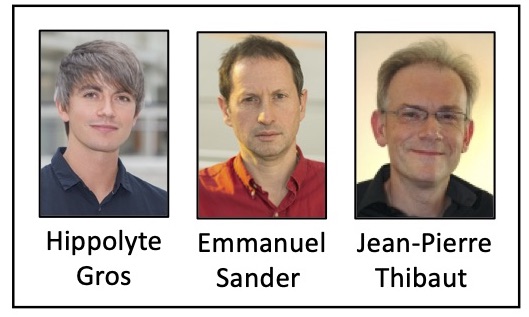
In the study, the authors take advantage of the fact that even when the underlying abstract mathematics is identical, people often attempt to use different strategies when solving problems using cardinal magnitudes than when solving problems with ordinal magnitudes. In general, cardinal numbers indicate how many things there are (how many kilograms, marbles, or dollars), while ordinal numbers indicate the order of things in a sequence.
Past research suggests that people tend to represent weight, collection, and price problems as cardinal, but duration, distance, and floor problems as ordinal. When solving cardinal problems people tend to use a 3-step algorithm and when solving the ordinal problem, people tend to use a 1-step process. Take the following cardinal problem on the left and the ordinal problem on the right below,
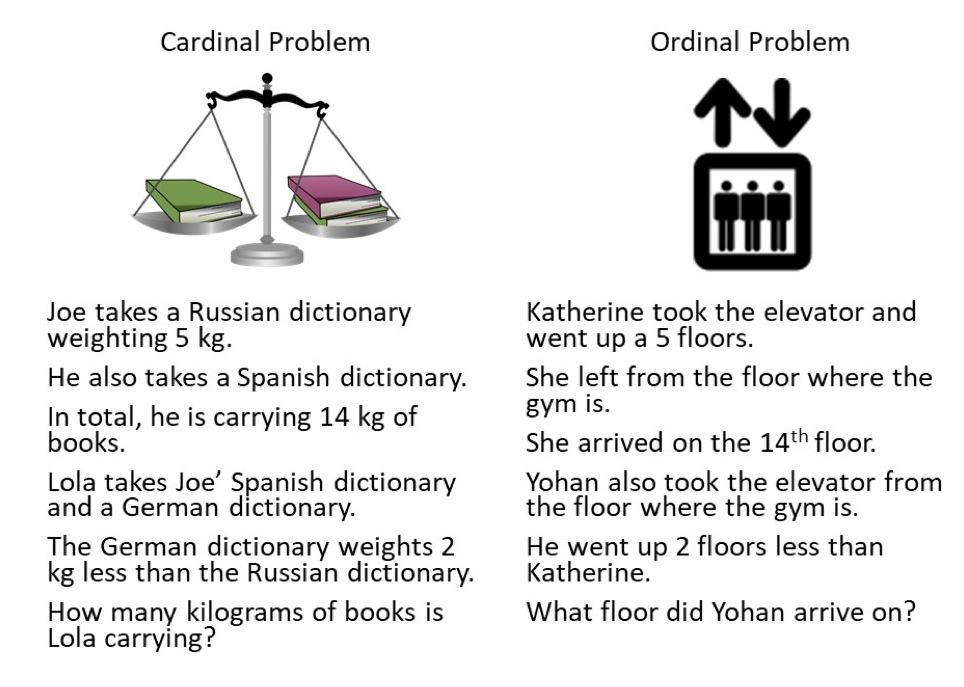
For the cardinal problem, people would first calculate the weight of each book before then calculating how much Lola is carrying:
Step 1: 14 – 5 = 9
Step 2: 5 – 2 = 3
Step 3: 9 + 3 = 12
For the ordinal problem, Yohan went up 2 floors less than Katherine so 14 – 2 = 12. Notably, the same 1-step algorithm works for cardinal problems (14 – 2 = 12), but people are less likely to use it.
Gros and colleagues took these cardinal and ordinal problems and modified them so that they were unsolvable using the 3-step solution. Below each problem, participants were presented with the correct one-step solutions and were asked to indicate if the provided solution was correct or if there was no solution to the problem. Here is an example of a cardinal problem and the response options,
Paul has a certain amount of red marbles.
He also has blue marbles.
In total, Paul has 14 marbles.
Jolene has as many blue marbles as Paul, and some green marbles.
She has two green marbles less than Paul has red marbles.
How many marbles does Jolene have?
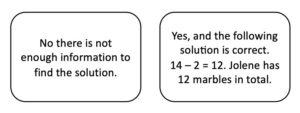
And here is an example of an ordinal problem and the response options,
Slouchy Smurf is a certain height.
He climbs on a Smurf table.
He now attains the height of 14 cm.
Grouchy Smart climbs on the same table as Slouchy Smurf.
Grouchy Smurf is 2 cm shorter than Slouchy Smurf.
What height does Grouchy Smurf attain when he climbs on the table?
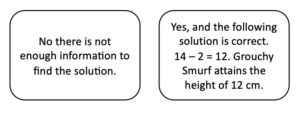
In the first experiment, 85 Parisian adults were presented with a series of solvable and unsolvable cardinal and ordinal problems. The participants had all taken at least some college courses, but none majored in mathematics.
The framing of the word problems had a large influence, participants were much more accurate at recognizing the correct solutions for ordinal problems as compared to cardinal problems.
Not only were college-educated adults swayed by the wording of the questions, mathematics experts were as well. In Experiment 2, the authors recruited 25 mathematics experts to answer the same questions. Each participant had successfully passed the natural science and mathematics entrance exam of the École Normale Supérieure in Paris. The École Normale Supérieure is a highly selective graduate school and the exam is considered the most demanding one in France (it is passed by only 2% of college-educated applicants).
Despite being highly skilled at mathematics, the experts still failed to recognize that the one-step solution was correct for almost 25% of the cardinal problems. Just like the participants in Experiment 1, they were much more accurate on the ordinal problems. The participants’ expertise was noticeable – they were overall more accurate than the participants in Experiment 1, and the difference between ordinal and cardinal problems was smaller, but the problem framing still affected their reasoning; as shown in the figure below.
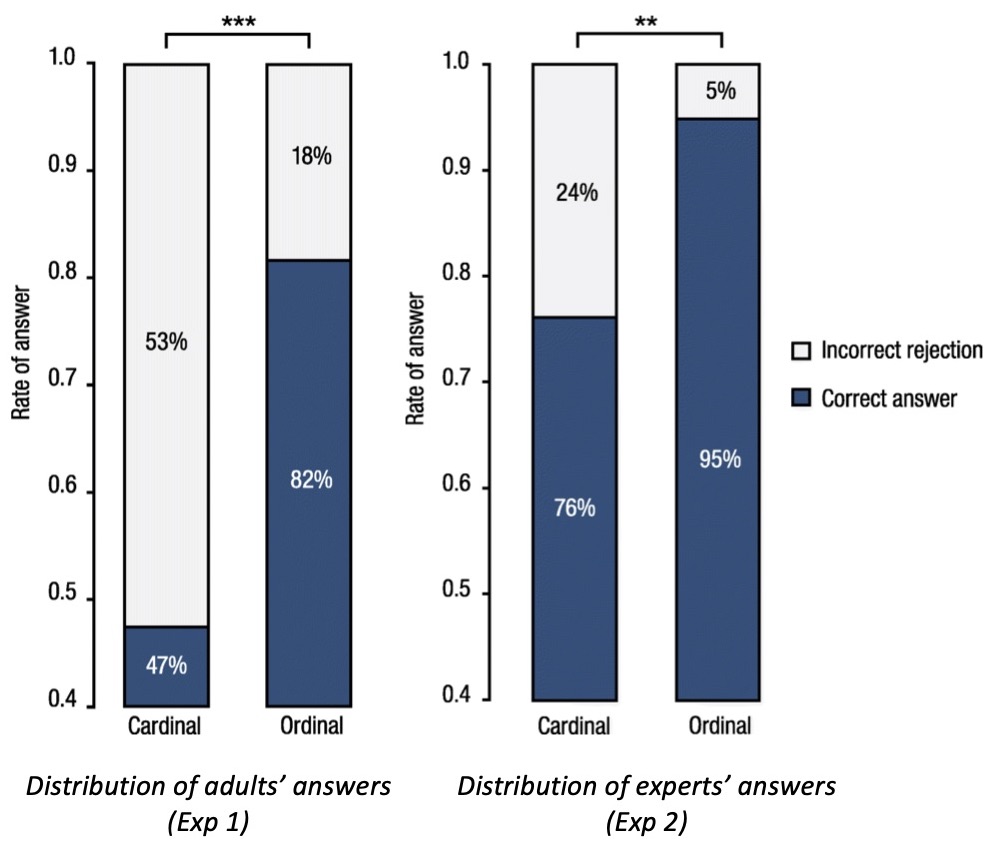
The results suggest that even mathematical experts are affected by how word problems are presented.
Our prior knowledge about weights, distances, heights and other quantities affects how we approach solving abstract mathematical problems. Our mathematical knowledge is not pure and isolated from our everyday knowledge – the two domains interact even when solving simple arithmetic problems like 14 – 2 = 12.
Psychonomics article focused on in this post:
Gros, H., Sander, E. & Thibaut, JP (2019). When masters of abstraction run into a concrete wall: Experts failing arithmetic word problems. Psychonomic Bulletin & Review, 26, 1738 – 1746. DOI: s13423-019-01628-3
